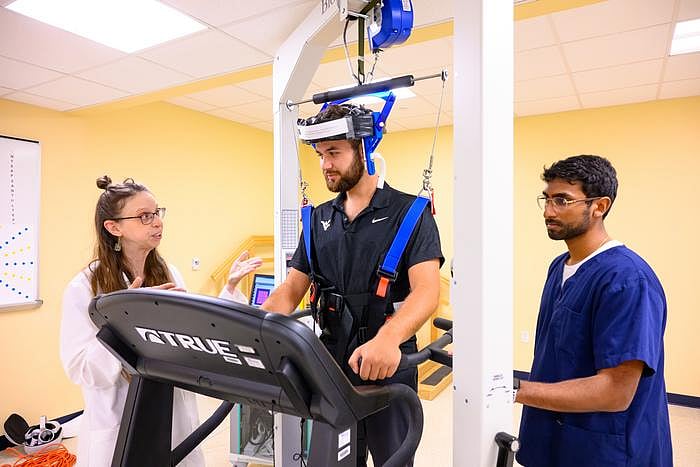Manténgase sano!

- Posted August 9, 2024
New Upright Scanner Tracks Brain Function While You Walk
A wearable brain scanner could improve research into Parkinson’s disease, dementia and other debilitating disorders, new research shows.
The brain scanner -- called the Ambulatory Motion-enabling PET (AMPET) -- fits on a person’s head much like a construction worker’s hard hat, the researchers explained.
“What we like about the AMPET is that it moves with the head, and you can be in a real environment where you’re immersed and walk with it on,” said senior study author Julie Brefczynski-Lewis, a research assistant professor with the West Virginia University Department of Neuroscience.
PET scans track the movement of injectable radioactive tracers through the body, allowing doctors to observe how organs function in real time.
Unfortunately, traditional PET scanners require patients to lie still for imaging, researchers noted.
That hampers the scan’s usefulness in diseases like Parkinson’s, which causes involuntary and uncontrollable spasms in patients, Brefczynski-Lewis said.
“This makes it difficult or impossible to test these patients when their symptoms become too severe, since regular brain imagers require staying very still,” Brefczynski-Lewis said in a university news release. “Also, if you want to study human behaviors like walking, anxiety-provoking tasks or even addiction, this device could provide a way to image.”
“It’s also helpful with imaging for patients with cognitive issues like dementia because they have trouble staying still and even understanding the instruction they need to stay still, so they usually have to be anesthetized,” Brefczynski-Lewis added. “If we want to image their brain while they’re awake and alert, this would be a way to do that as well.”
To test the prototype, researchers recruited volunteers who were scheduled for other scans. The participants were asked to walk in place while researchers assessed neural activity in brain regions associated with movement.
“We observed brain activity in the parts of the brain that control leg movements when the patients walked, which was what we had hoped to see,” Brefczynski-Lewis said.
One patient had a prosthetic leg from hip to foot, and his brain activity displayed predominantly in the region representing the natural leg.
“That was almost a separate test in itself that we didn’t expect,” Brefczynski-Lewis said.
The new study was published recently in the journal Communications Medicine.
Researchers next plan to add a motion tracking system to the helmet. They also want to make the helmet bigger so it can scan a larger area of the brain.
“Motion tracking is already made for other technologies, so all we have to do is apply it to our device,” Brefczynski-Lewis said. “That will help because sometimes we miss the area of the brain we want to see.”
In addition to helping scan people who can’t stay still, the helmet also can be useful for researchers studying natural movements like gestures, conversation and balance, the researchers added.
“In order to study balance, people have been in MRIs lying down and imagining themselves balancing, which isn’t the same as actually balancing, or they have a surface imager that doesn’t capture the deep brain structures,” Brefczynski-Lewis said. “You can see some parts of the brain, but not the deep core parts of the brain that are usually more involved with things like movement, balance, emotion, memory, fear and joy.”
“To be able to image the brain in motion, we’re showing that there’s a whole new field that could open up because of our device,” she added. “We can extend our neuroimaging research into human behaviors that are natural -- how we interact with the world and how we interact with others.”
More information
The Cleveland Clinic has more about PET scans.
SOURCE: West Virginia University, news release, Aug. 7, 2024







